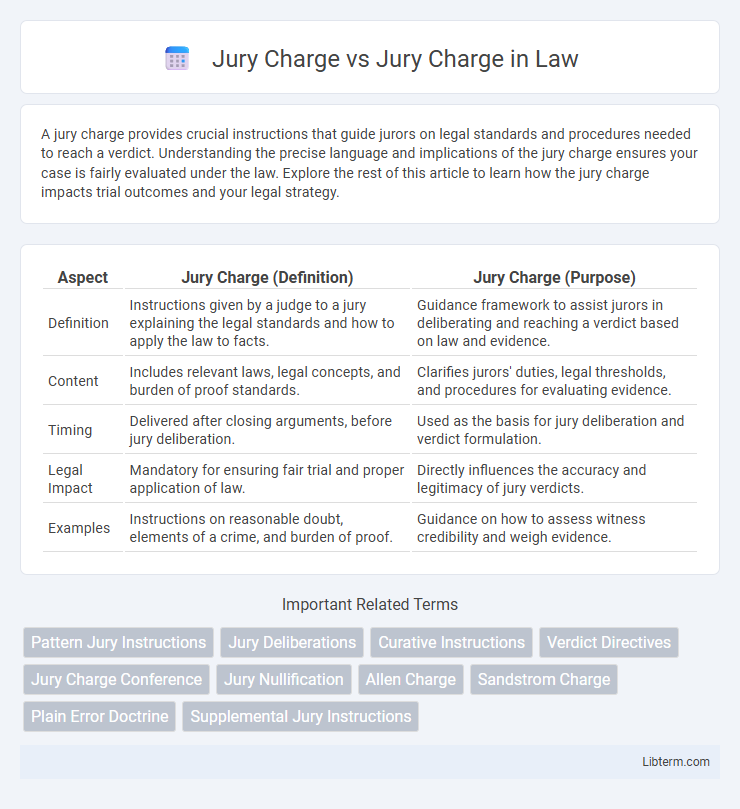A jury charge provides crucial instructions that guide jurors on legal standards and procedures needed to reach a verdict. Understanding the precise language and implications of the jury charge ensures your case is fairly evaluated under the law. Explore the rest of this article to learn how the jury charge impacts trial outcomes and your legal strategy.
Table of Comparison
| Aspect | Jury Charge (Definition) | Jury Charge (Purpose) |
|---|---|---|
| Definition | Instructions given by a judge to a jury explaining the legal standards and how to apply the law to facts. | Guidance framework to assist jurors in deliberating and reaching a verdict based on law and evidence. |
| Content | Includes relevant laws, legal concepts, and burden of proof standards. | Clarifies jurors' duties, legal thresholds, and procedures for evaluating evidence. |
| Timing | Delivered after closing arguments, before jury deliberation. | Used as the basis for jury deliberation and verdict formulation. |
| Legal Impact | Mandatory for ensuring fair trial and proper application of law. | Directly influences the accuracy and legitimacy of jury verdicts. |
| Examples | Instructions on reasonable doubt, elements of a crime, and burden of proof. | Guidance on how to assess witness credibility and weigh evidence. |
Introduction to Jury Charge
Jury Charge refers to the instructions given by a judge to the jury outlining the legal standards they must apply when deliberating on a case. These instructions clarify the elements of the charged offenses, the burden of proof, and the relevant legal principles, ensuring jurors understand their duties. Proper jury charge formulation is critical to a fair trial, directly impacting verdict accuracy and appeal outcomes.
Definition of Jury Charge
A jury charge is a set of legal instructions given by a judge to the jury explaining the relevant laws and how they should be applied to the facts of the case. Jury charges help ensure jurors understand the legal standards they must use to reach a verdict. Clear and precise jury charges are critical to a fair trial and can be a significant factor in appeals if found to be erroneous or misleading.
Purpose of Jury Charges in Trials
Jury charges serve as essential instructions provided by the judge to the jury, clarifying legal standards and guiding the evaluation of evidence during trials. Their primary purpose is to ensure jurors understand the applicable laws and how to apply them impartially to the facts presented, fostering a fair and consistent verdict. Properly formulated jury charges prevent misinterpretation and support the integrity of the judicial process.
Types of Jury Charges
Types of jury charges include general charges, special charges, and specific legal instructions tailored to the case. General charges provide broad guidance on legal standards and burden of proof, while special charges address particular issues or questions the jury must decide. Specific instructions clarify complex laws, ensuring jurors understand their duties and apply the law accurately during deliberations.
Key Components of a Jury Charge
A jury charge is a critical judicial instruction outlining the legal standards and elements that jurors must consider when deliberating a case. Key components include the explanation of relevant laws, guidance on how to assess evidence and witness credibility, and clear directives on the burden of proof. Precise and unambiguous jury charges ensure jurors understand their responsibilities, minimizing the risk of errors or appeals based on misinterpretation.
Procedural Differences in Jury Charges
Procedural differences in jury charges primarily involve the timing and content of instructions provided to jurors before deliberation. Jury charges in criminal cases emphasize specific legal standards such as burden of proof and elements of crimes, while civil jury charges focus on issues like liability, damages, and burden of persuasion. Variations also exist in whether judges provide written or oral charges, with some jurisdictions mandating detailed written instructions to ensure clarity and reduce appeals.
Common Issues in Jury Charge Disputes
Common issues in jury charge disputes often involve ambiguous or misleading language that can confuse jurors and affect verdict accuracy. Disputes frequently arise when instructions fail to clearly define legal standards or omit critical elements of the law, leading to inconsistent interpretations. Courts routinely evaluate jury charge errors based on whether they were harmless or prejudicial, impacting the potential for retrials or appeals.
Jury Charge in Civil vs Criminal Cases
Jury charge in civil cases primarily instructs jurors on legal standards such as preponderance of evidence, focusing on liability and damages assessment. In contrast, jury charge in criminal cases emphasizes the burden of proof beyond a reasonable doubt, outlining elements of the alleged crime and defendants' rights. Accurate jury instructions are critical to ensure jurors apply the correct legal criteria, directly influencing verdict outcomes in both civil and criminal trials.
Best Practices for Drafting Jury Charges
Best practices for drafting jury charges emphasize clarity, precision, and alignment with applicable law to ensure jurors accurately understand their duties. Charges should avoid legal jargon, use plain language, and clearly define key terms, enabling effective decision-making based on evidence presented. Consistent use of statutory language and thorough review for completeness minimizes grounds for appeal and reinforces trial fairness.
Conclusion: Jury Charge Significance in Legal Proceedings
The jury charge plays a crucial role in legal proceedings by clearly outlining the legal standards and issues the jury must consider, ensuring accurate application of the law. Precise and well-structured jury instructions help prevent misinterpretations that could lead to appeals or mistrials, safeguarding the fairness of the trial process. Effective jury charges contribute significantly to the integrity of verdicts by guiding jurors through complex legal concepts with clarity and precision.
Jury Charge Infographic

 libterm.com
libterm.com